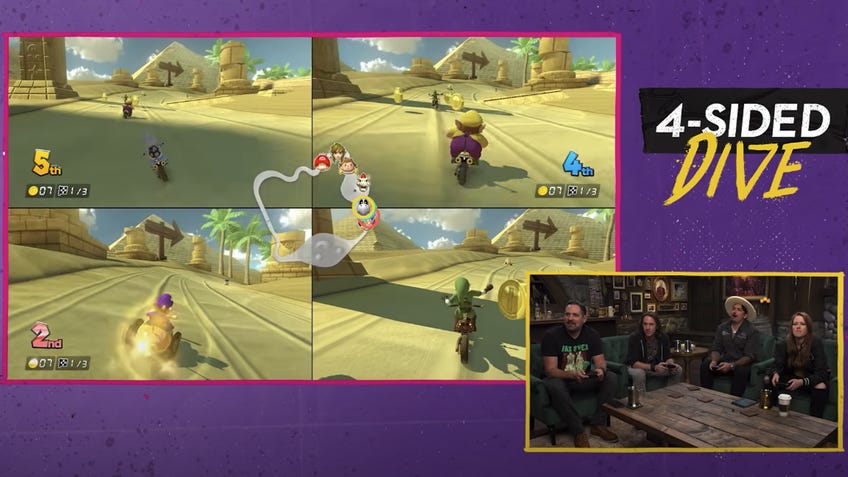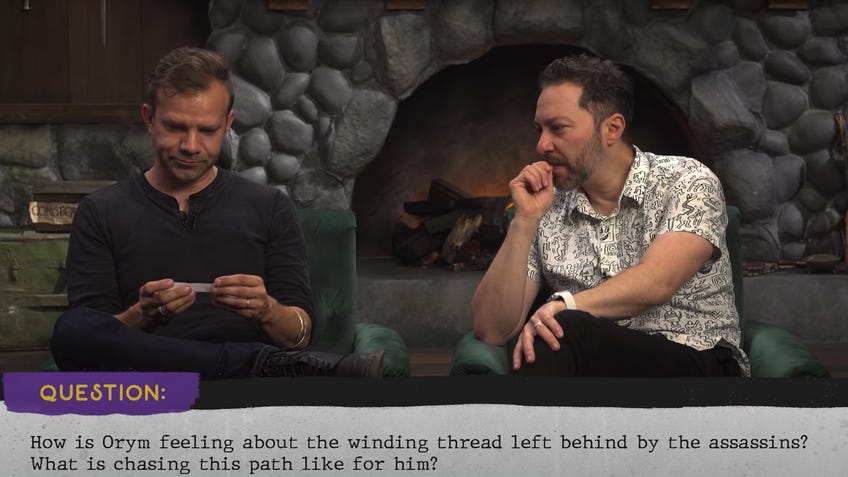Critical Role’s new talk show has a problem
Mask of Many Faces.
It is difficult, watching Critical Role’s new talk show, to see how things ended up here.
The actual-play D&D series has captured the hearts of many tabletop RPG fans over the past seven years - thanks to its brilliant voice acting, sustained and complex world-building, and the clear on-screen chemistry between its cast of real-world friends.
A huge part of that success is, as ever in the online age, due to fans’ ability to see behind the curtain of their favourite content creators: hearing about their character motivations, how they approached creating in-game personalities and getting a better sense of who they are. Critical Role’s original interview show, Talks Machina, was able to scratch that itch until its cancellation last year in favour of a new, overhauled format.
But this latest behind-the-scenes companion stream, kicking off alongside early episodes of Campaign 3, is off to a very confusing start.
4-Sided Dive began in April 2022, eschewing Talks Machina’s more traditional interview format for a four-way discussion between different cast members, all rolling a die to determine who will ‘host’ the session.
The host reads out a preamble from a teleprompter, before moving onto various Q&A segments. As with Talks Machina, fans can send in questions – but they’re largely sidelined here in favour of questions prepared by Critical Role’s crew, allowing more control over the discussion at hand.
The result is a mixed bag of odd choices, feeling undercooked and overproduced at the same time.
One or two ‘evergreen’ fan queries - consisting of generic questions for the cast rather than deeper dives into specific moments - are chosen through a ‘Chenga’ tower (non-copyrighted Jenga, naturally), where the cast picks a random block with a number that designates a certain question. The show ends with a video game segment, as cast members play a multiplayer title together (Mario Kart and the like), effectively smashing the formats of Talks Machina and Yee-Haw Game Ranch together.
The result is a mixed bag of odd choices, feeling undercooked and overproduced at the same time. The lack of a fixed host makes for a casual atmosphere but also means 4-Sided Dive has no real identity. No-one feels in charge, or able to fully take the reins. When crew members have to remind everyone how the show is structured, and how long each section goes on for, it all seems a little unfocused and distracts from the questions at hand.

While I can’t begrudge the CR team moving from biweekly to monthly streams - it should halve the work involved, after all - the sheer number of moving parts crammed together means 4-Sided Dive loses sight of the purpose of an interview show: to find out more about the cast and their process. Everything else is just noise.
The cast spends so much time navigating the different segments that we lose the straightforward, revealing conversation that Talks was so good at eliciting. Doubling the cast members present and ditching a continuous interviewer has simply bloated the format without any reliable foundation - bringing the Chenga tower crumbling down.
The divide between ‘approved’ questions and sidelined ‘fan’ input is disappointing, too. With Critical Role’s massive fanbase, there shouldn’t be any issue sourcing regular, timely questions, and good analysis of in-game events should still be relevant weeks after the fact. Even cast member Sam Reigel dismisses the ‘evergreen’ requirement for fan questions, moments after reading it from the teleprompter – and it’s unclear who, if anyone, is in charge.
Part of the problem is likely a desire to distance 4-Sided Dive from its predecessor.
There’s little official comment on why Talks Machina and its host, Brian W. Foster, were replaced - and no end of fan speculation on Reddit, where r/CriticalRole mods repeatedly have to lock down threads that get too “toxic” on the subject. (This tweet thread by Foster appears to hint broadly at what went down.)
Doubling the cast members present and ditching a continuous interviewer has simply bloated the format without any reliable foundation.
Whatever happened, the hostless format feels like a possible way to sidestep the issue - ensuring discontented fans who wished Foster stayed on can’t focus their ire on any replacement. Of course, it may also be a way to try out some new things, and keep the format feeling fresh. I expect we’ll see changes in the months ahead, as wrinkles are ironed out and the structure is streamlined, much like a homebrew subclass getting tweaked on the fly. (Hopefully with fan-favourite crew member Dani Carr taking a more central role.)
For now, though, the impulse to package together disparate kinds of programming into a single stream, and prevent any individual from becoming the ‘face’ of the show, feels like throwing everything ‘into the gumbo’ without a supervising chef.
Both the camera and the scope of the show has zoomed out - a bigger, broader overview that loses the detail, the insight, that a more focused interview format could provide.



